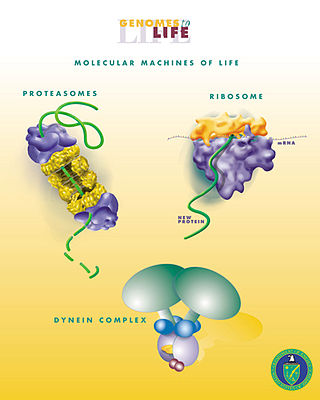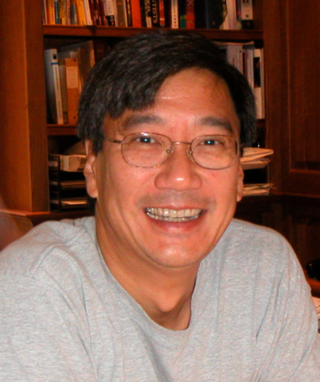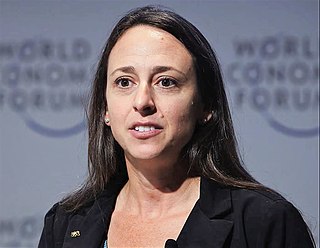Related Research Articles

The University of California, San Francisco (UCSF) is a public land-grant research university in San Francisco, California. It is part of the University of California system and is dedicated entirely to health science and life science. It conducts research and teaching in medical and biological sciences.

Joseph Lyman DeRisi is an American biochemist, specializing in molecular biology, parasitology, genomics, virology, and computational biology.

Biological engineering or bioengineering is the application of principles of biology and the tools of engineering to create usable, tangible, economically viable products. Biological engineering employs knowledge and expertise from a number of pure and applied sciences, such as mass and heat transfer, kinetics, biocatalysts, biomechanics, bioinformatics, separation and purification processes, bioreactor design, surface science, fluid mechanics, thermodynamics, and polymer science. It is used in the design of medical devices, diagnostic equipment, biocompatible materials, renewable energy, ecological engineering, agricultural engineering, process engineering and catalysis, and other areas that improve the living standards of societies.

Russ Biagio Altman is an American professor of bioengineering, genetics, medicine, and biomedical data science and past chairman of the bioengineering department at Stanford University.

Cornelia Isabella "Cori" Bargmann is an American neurobiologist. She is known for her work on the genetic and neural circuit mechanisms of behavior using C. elegans, particularly the mechanisms of olfaction in the worm. She has been elected to the National Academy of Sciences and had been a Howard Hughes Medical Institute investigator at UCSF and then Rockefeller University from 1995 to 2016. She was the Head of Science at the Chan Zuckerberg Initiative from 2016 to 2022. In 2012 she was awarded the $1 million Kavli Prize, and in 2013 the $3 million Breakthrough Prize in Life Sciences.

Peter S. Kim is an American scientist. He was president of Merck Research Laboratories (MRL) 2003–2013 and is currently Virginia & D.K. Ludwig Professor of Biochemistry at Stanford University, Institute Scholar at Stanford ChEM-H, and Lead Investigator of the Infectious Disease Initiative at the Chan Zuckerberg Biohub.
Shana O. Kelley is a scientist and Neena B. Schwartz Professor of Chemistry and Biomedical Engineering at Northwestern University. She is affiliated with Northwestern's International Institute for Nanotechnology and was previously part of the University of Toronto's Faculty of Pharmacy and Faculty of Medicine. Kelley's research includes the development of new technologies for clinical diagnostics and drug delivery. In 2023, she was chosen as president of Chicago's new Chan Zuckerberg Biohub.
Thomas Dean Pollard is a prominent educator, cell biologist and biophysicist whose research focuses on understanding cell motility through the study of actin filaments and myosin motors. He is Sterling Professor Emeritus of Molecular, Cellular & Developmental Biology and a professor emeritus of cell biology and molecular biophysics & biochemistry at Yale University. He was dean of Yale's Graduate School of Arts and Sciences from 2010 to 2014, and president of the Salk Institute for Biological Studies from 1996 to 2001.
Michael Andrew Fischbach is an American chemist, microbiologist, and geneticist. He is an associate professor of Bioengineering and ChEM-H Faculty Fellow at Stanford University and a Chan Zuckerberg Biohub Investigator.
Chan Zuckerberg Biohub, or simply Biohub, is a nonprofit research organization. In addition to supporting and conducting original research, CZ Biohub acts as a hub and fosters science collaboration between UC Berkeley, UC San Francisco (UCSF) and Stanford. The Biohub is funded by a $600 million contribution from Facebook CEO and founder Mark Zuckerberg and his wife Priscilla Chan. It was co-led by Stephen Quake and Joseph DeRisi from its inception in 2016 until 2022, when Quake left to become president of the Biohub Network. Sandra Schmid joined as Chief Scientific Officer in 2020.
Alexander Marson is an American biologist and infectious disease doctor who specializes in genetics, human immunology, and genome engineering. He is the Director of the Gladstone-UCSF Institute of Genomic Immunology, and a tenured Professor with a dual appointment in the Department of Medicine and the Department of Microbiology & Immunology at the University of California, San Francisco (UCSF).
Juliane Nguyen is a professor at UNC Eshelman School of Pharmacy and vice chair of the Division of Pharmacoengineering and Molecular Pharmaceutics (DPMP). She is also the Director of Graduate Admissions in DPMP at UNC at Chapel Hill.
Lisa Gunaydin is an American neuroscientist and assistant professor at the Weill Institute for Neurosciences at the University of California San Francisco. Gunaydin helped discover optogenetics in the lab of Karl Deisseroth and now uses this technique in combination with neural and behavioral recordings to probe the neural circuits underlying emotional behaviors.
Polly Fordyce is an Associate Professor of Genetics and Bioengineering and fellow of the ChEM-H Institute at Stanford University. Her laboratory's research focuses on developing and applying new microfluidic platforms for quantitative, high-throughput biophysics and biochemistry and single-cell genomics.

Amy Elizabeth Herr is an American professor. She is the John D. and Catherine T. MacArthur Professor at the University of California, Berkeley, where she is attached to the Department of Bioengineering. At Berkeley she was also the founding executive director of the Bakar Bioenginuity Hub. Herr is a Chan Zuckerberg BioHub Investigator and the Chief Technology Officer of the Chan Zuckerberg Biohub Network, a fellow of both the National Academy of Inventors and the American Institute of Medical and Biological Engineering, as well as a co-founder of Zephyrus Biosciences, a biotechnology company that was acquired by Bio-Techne.
Katherine Snowden Pollard is the Director of the Gladstone Institute of Data Science and Biotechnology and a professor at the University of California, San Francisco (UCSF). She is a Chan Zuckerberg Biohub Investigator. She was awarded Fellowship of the International Society for Computational Biology in 2020 and the American Institute for Medical and Biological Engineering in 2021 for outstanding contributions to computational biology and bioinformatics.

Peter J. Turnbaugh is a microbiologist and a professor at University of California, San Francisco. He is known for his research on the metabolic activities performed by the trillions of microbes that colonize humans' adult bodies. Turnbaugh and his research group use interdisciplinary approaches in preclinical models and human cohorts to study the mechanisms through which the gut microbiome influences nutrition and pharmacology.

Markita del Carpio Landry is a Bolivian-American chemist who is an associate professor in the department of chemical engineering at the University of California, Berkeley. Her research considers nanomaterials for brain imaging and the development of sustainable crops. She was a recipient of the 2022 Vilcek prize for creative promise. del Carpio Landry's work has been featured on NPR, popular mechanics, the San Francisco Chronicle, and C&E News.
Danica Galonić Fujimori is a Serbian-American chemical biologist who is a professor at the University of California, San Francisco. Her research considers nucleic acid synthesis and tissue engineering. In the search for new therapeutics and vaccines, she has studied the interactions between ribosomes and SARS-CoV-2.
Aaron Michael Streets is an African American bioengineer and associate professor in the Department of Engineering at the University of California, Berkeley in Berkeley, California. He is the principal investigator at the Streets Lab, where he and his team use tools from mathematics, physics, and engineering to study biology. Streets is currently developing microfluidic technology for single-cell measurements due to its high-resolution imaging.
References
- ↑ Paris, Sarah (2021-01-30). "Butte, Guccione, Kortemme, and Link Inducted Into American Institute for Medical and Biological Engineering". Precision Medicine at UCSF. Archived from the original on January 30, 2021. Retrieved 2024-06-11.
- 1 2 "Kortemme Named Sloan Fellow". pharmacy.ucsf.edu. April 6, 2005. Retrieved April 5, 2019.
- ↑ Goodman, Sally (February 2004). "Getting mobile in Europe". Nature. 427 (6977): 868–869. Bibcode:2004Natur.427..868G. doi:10.1038/nj6977-868a. PMID 14985769. S2CID 5461645.
- ↑ "Faculty honors and awards". ccb.ucsf.edu. Retrieved April 5, 2019.
- ↑ Jacobson, David (April 13, 2012). "New NIH funding awarded to the Department of Bioengineering and Therapeutic Sciences in 2011". pharmacy.ucsf.edu. Retrieved April 5, 2019.
- ↑ Kaiser, Jocelyn (2017-02-08). "Chan Zuckerberg Biohub funds first crop of 47 investigators". Science. doi:10.1126/science.aal0719. ISSN 0036-8075.
- ↑ "15 UCSF Researchers Named to First Cohort of Chan Zuckerberg Biohub Investigators". 2017-02-08.
{{cite journal}}: Cite journal requires|journal=(help) - ↑ Gadye, Levi (March 28, 2019). "Kortemme and Desai honored at annual meeting of the American Institute for Medical and Biological Engineering". pharmacy.ucsf.edu. Retrieved April 5, 2019.